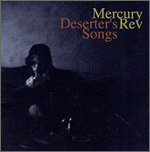| |
1990s |
|
Ágætis Byrjun, Sigur Rós
Automatic for the People, R.E.M.
Bewitched, Luna
Bilingual, Pet Shop Boys
The Boatman’s Call, Nick Cave & The Bad Seeds
Burned, Electrafixion
Deserter’s Songs, Mercury Rev
Everything Must Go, Manic Street Preachers
Head Music, Suede
Heaven on a Popsicle Stick, Smoke
I Do Not Want What I Haven’t Got, Sinéad O’Connor
The Immaculate Collection, Madonna
In Utero, Nirvana
Jagged Little Pill, Alanis Morissette
Mellon Collie and the Infinite Sadness, The Smashing Pumpkins
Odelay, Beck
The Orb’s Adventures Beyond the Ultraworld, The Orb
Painful, Yo La Tengo
Remedy, Basement Jaxx
Roman Candle, Elliott Smith
Second Toughest in the Infants, Underworld
Surrender, The Chemical Brothers
Take it from the Man!, The Brian Jonestown Massacre
The Three EPs, The Beta Band
This Is Hardcore, Pulp
Through the Trees, The Handsome Family
Wonderwheel, Utah Carol |
|
|
Deserter’s Songs,
Mercury Rev
V2 Records, September 29, 1998
Track Listing: 1. Holes, 2. Tonite It Shows, 3. Endlessly, 4. I Collect Coins, 5. Opus 40, 6. Hudson Line, 7. The Happy End (The Drunk Room), 8. Goddess on a Hiway, 9. The Funny Bird, 10. Pick Up If You're There, 11. Delta Sun Bottleneck Stomp
Music is dubbed the soundtrack of our lives: A familiar rhythm beats aloud, and thoughts shuttle to a place and time out of the past, deporting the listener to a high school sock hop, an occasion of sadness laced in isolation or a passionate tussle of human touch. Regardless of what custom scene materializes, the moving image appears accompanied by a distinct score that matches the notes triggering the flashback. In an instant, locked auditory and visual senses are effortlessly loaded for recall, unless biology intervenes and sneakily disconnects the mind’s state-of-the-art entertainment system, which stores a compendium of greatest hits and corresponding video. Yes, song has the ability to intricately fuse with memory; however, not all tunes are detained by the brain’s capacity to apprehend nostalgia. Some evade capture.
The rarest of melodies amplify on an entirely different plane, an ethereal frontline where personal reminiscence cannot highjack the individuality of composition or expression. They are orchestrations that reverberate, until they fade and circle back, only to, once again, flee beyond borders … until the next chance encounter. Every meeting presents itself as a first hello. We are drawn to open our ears and indulge in foreign surround at each presentation, while internal mechanisms fail to synch the music with a clip from history. Connections to bygone days dodge oncoming stanzas because innovative instrumentation, obscure lyrics, and unfamiliar chords do not tunnel deep into agglutinant gray matter but straight through the permeable human spirit.
“Holes, dug by little moles
Angry jealous spies
Got telephones for eyes”
-from “Holes”
Emotion is created during passage—not revisited. Refrains are a new experience. A happening. And the music plays disassociated from consciousness.
“Into a dream I took a turn
And promised to return”
-from “Tonite It Shows”
None are the titles heard on American Top 40. In fact, no single track is queued in heavy rotation whatsoever. Limited acquaintance further contributes to a diminished opportunity for attachment, so, by comparison, a stronger bond is more probable between tree sap dripped from an overhanging branch and automotive paint positioned below. No, these songs, if they overshoot the soul, are better inclined to hit the surface with a grand crash and disseminate into a million disparate pieces.
“When I see your eyes arrive
They explode like two bugs on glass”
-from “Goddess on a Hiway”
Should a random smidgeon stick after decimation, the flyaway counterparts resist containment and engage in a fierce battle to regroup. At-large particles quickly align as amorphous factions that command a unified surge intent upon locating any missing trace of itself lodged within the hardware of recollection much the way shrapnel imbeds within brick following a terrorist blast. Operating on a mission to reclaim their rights whole, free-floating shards ambush the cortex, which also fights for permanent seizure of the lone fragment, and charge their target, busting into cherished moments, stealing the component of our internal systemization that harbors the dislocated material. Amid the incursion, we are held hostage by a sudden reversal. The music regains an upper hand—no longer a prisoner—escaping, as a singular entity, in a clean getaway.
In a final coup, the songs abscond with a piece of us, rather than we with them. Frustration over an inability to retain the experience diminishes, upon the realization that we have not been robbed of anything ours to possess. This music was merely on loan.
As the defiant themes finally abandon their host, dashing off into the darkness, rest only comes due to the knowledge that the fugitive equally desires future refuge. We visualize in silence the thrill of a return too cunning to rehash the past. Until then, the remaining complaisant ditties tied to memories are safely guarded, while performing their duty of filling-in the intervening gaps.
-MEG

|
|
 |

